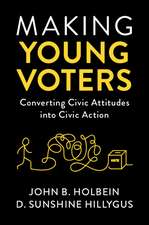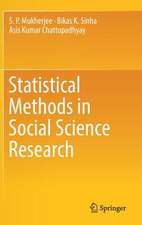Why Society is a Complex Matter: Meeting Twenty-first Century Challenges with a New Kind of Science
Autor Philip Ballen Limba Engleză Paperback – 8 iun 2012
This book shows how some of these ideas from the science of complexity can be applied to the study and management of social phenomena, including traffic flow, economic markets, opinion formation and the growth and structure of cities. Building on these successes, the book argues that the complex-systems view of the social sciences has now matured sufficiently for it to be possible, desirable and perhaps essential to attempt a grander objective: to integrate these efforts into a unified scheme for studying, understanding and ultimately predicting what happens in the world we have made. Such a scheme would require the mobilization and collaboration of many different research communities, and would allow society and its interactions with the physical environment to be explored through realistic models and large-scale data collection and analysis. It should enable us to find new and effectivesolutions to major global problems such as conflict, disease, financial instability, environmental despoliation and poverty, while avoiding unintended policy consequences. It could give us the foresight to anticipate and ameliorate crises, and to begin tackling some of the most intractable problems of the twenty-first century.
Preț: 129.86 lei
Nou
Puncte Express: 195
Preț estimativ în valută:
24.85€ • 25.94$ • 20.57£
24.85€ • 25.94$ • 20.57£
Carte disponibilă
Livrare economică 14-28 martie
Preluare comenzi: 021 569.72.76
Specificații
ISBN-13: 9783642289996
ISBN-10: 3642289991
Pagini: 80
Ilustrații: XII, 60 p. 75 illus., 35 illus. in color.
Dimensiuni: 210 x 279 x 10 mm
Greutate: 0.25 kg
Ediția:2012
Editura: Springer Berlin, Heidelberg
Colecția Springer
Locul publicării:Berlin, Heidelberg, Germany
ISBN-10: 3642289991
Pagini: 80
Ilustrații: XII, 60 p. 75 illus., 35 illus. in color.
Dimensiuni: 210 x 279 x 10 mm
Greutate: 0.25 kg
Ediția:2012
Editura: Springer Berlin, Heidelberg
Colecția Springer
Locul publicării:Berlin, Heidelberg, Germany
Public țintă
Popular/generalCuprins
Society: a Complex Problem.- On the Road: Predicting traffic.- Every Move You Make: Patterns of crowd movement.- Making Your Mind Up: Norms and decisions.- Broken Windows: The spread and control of crime.- The Social Web: Networks and their failures.- Spreading It Around: Mobility, disease and epidemics.- After the Crash: Economic and financial systems.- Love Thy Neighbour: How to foster cooperation.- Living Cities: Urban development as a complex system.- The Transformation of War: Modelling modern conflict.- Towards a Living Earth Simulator: The FuturICT Project.
Recenzii
From the reviews:
“Phil Ball’s little book is one of the best summaries I have come across on complexity theory and its applications. This little triumph of clarity argues that society’s problems are those of highly connected systems. … Nice gentle text. If are a newcomer to complexity sciences, then read this first.” (Urban Models + Spatial Complexity + Smart Cities, August, 2012)
“Phil Ball’s little book is one of the best summaries I have come across on complexity theory and its applications. This little triumph of clarity argues that society’s problems are those of highly connected systems. … Nice gentle text. If are a newcomer to complexity sciences, then read this first.” (Urban Models + Spatial Complexity + Smart Cities, August, 2012)
Notă biografică
Philip Ball http://www.philipball.co.uk/ is a very well known science writer, former editor for Nature, and author of many popular science books.
Textul de pe ultima copertă
Society is complicated. But this book argues that this does not place it beyond the reach of a science that can help to explain and perhaps even to predict social behaviour. As a system made up of many interacting agents – people, groups, institutions and governments, as well as physical and technological structures such as roads and computer networks – society can be regarded as a complex system. In recent years, scientists have made great progress in understanding how such complex systems operate, ranging from animal populations to earthquakes and weather. These systems show behaviours that cannot be predicted or intuited by focusing on the individual components, but which emerge spontaneously as a consequence of their interactions: they are said to be ‘self-organized’. Attempts to direct or manage such emergent properties generally reveal that ‘top-down’ approaches, which try to dictate a particular outcome, are ineffectual, and that what is needed instead is a ‘bottom-up’ approach that aims to guide self-organization towards desirable states.
This book shows how some of these ideas from the science of complexity can be applied to the study and management of social phenomena, including traffic flow, economic markets, opinion formation and the growth and structure of cities. Building on these successes, the book argues that the complex-systems view of the social sciences has now matured sufficiently for it to be possible, desirable and perhaps essential to attempt a grander objective: to integrate these efforts into a unified scheme for studying, understanding and ultimately predicting what happens in the world we have made. Such a scheme would require the mobilization and collaboration of many different research communities, and would allow society and its interactions with the physical environment to be explored throughrealistic models and large-scale data collection and analysis. It should enable us to find new and effective solutions to major global problems such as conflict, disease, financial instability, environmental despoliation and poverty, while avoiding unintended policy consequences. It could give us the foresight to anticipate and ameliorate crises, and to begin tackling some of the most intractable problems of the twenty-first century.
This book shows how some of these ideas from the science of complexity can be applied to the study and management of social phenomena, including traffic flow, economic markets, opinion formation and the growth and structure of cities. Building on these successes, the book argues that the complex-systems view of the social sciences has now matured sufficiently for it to be possible, desirable and perhaps essential to attempt a grander objective: to integrate these efforts into a unified scheme for studying, understanding and ultimately predicting what happens in the world we have made. Such a scheme would require the mobilization and collaboration of many different research communities, and would allow society and its interactions with the physical environment to be explored throughrealistic models and large-scale data collection and analysis. It should enable us to find new and effective solutions to major global problems such as conflict, disease, financial instability, environmental despoliation and poverty, while avoiding unintended policy consequences. It could give us the foresight to anticipate and ameliorate crises, and to begin tackling some of the most intractable problems of the twenty-first century.
Caracteristici
Explains and exemplifies the application of complex-systems theory to understanding real and pressing societal problems, such as financial crises, pandemics, war and terrorism, human mobility and migration Written in concise and accessible language by acclaimed science writer Philip Ball Relevant to a broad readership – from non-specialist scientist and technologists to public administrators and the interested public






















